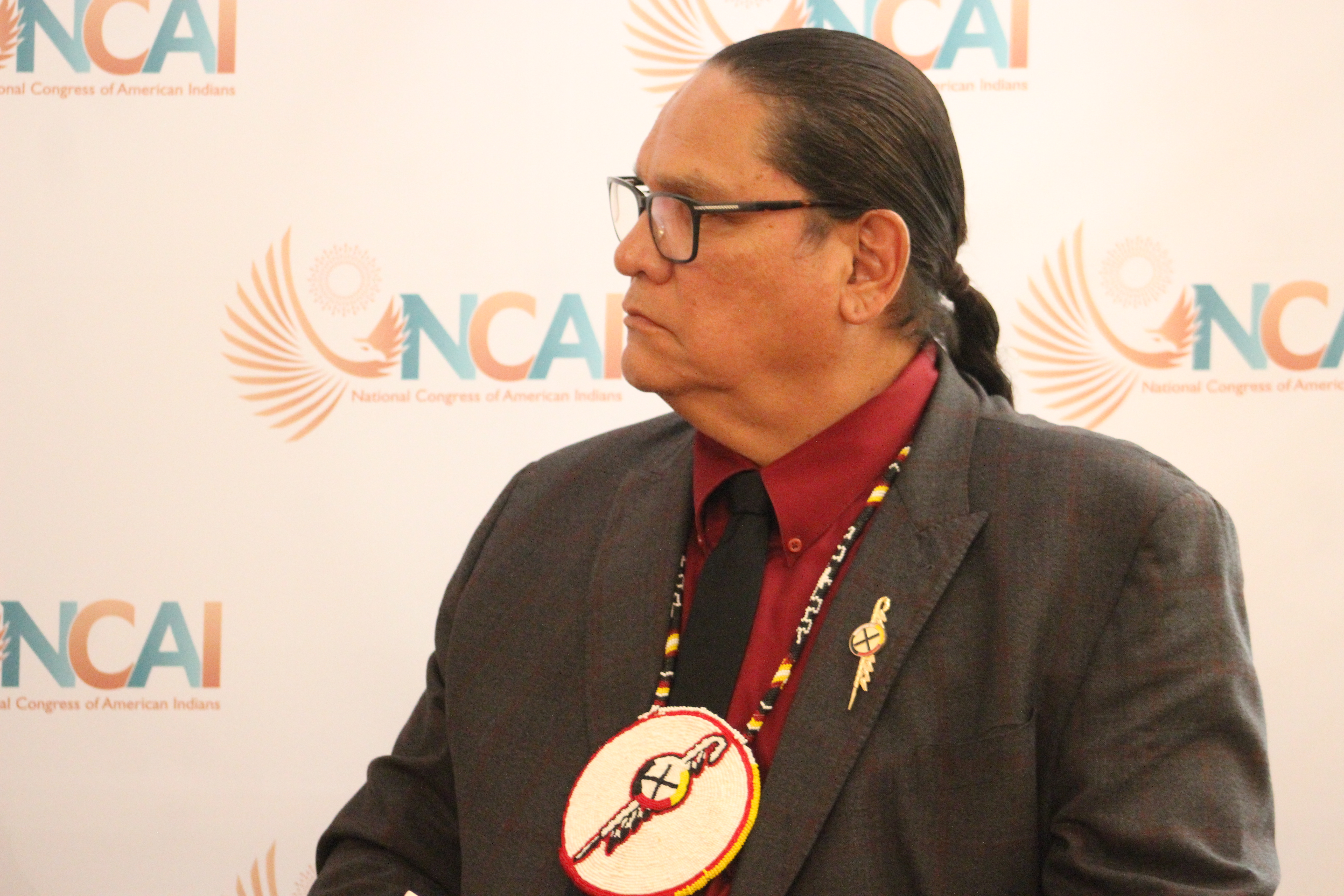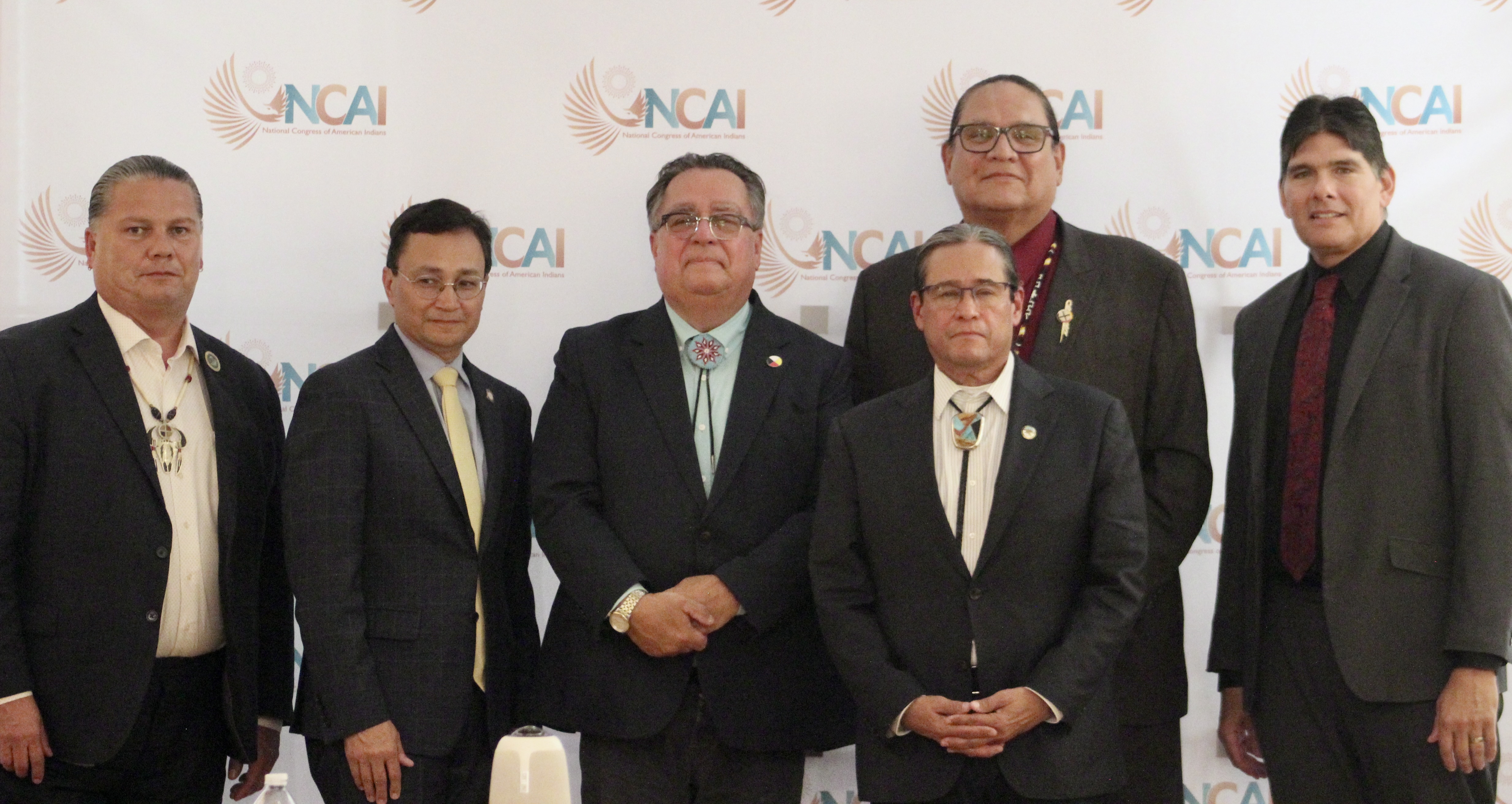
- Details
- By Neely Bardwell
Two weeks ago, on Thursday, September 18, Indian Gaming Association (IGA) Chairman Ernie Stevens Jr. participated in a press conference at the National Congress of American Indians (NCAI) in Washington, D.C. The press conference marked the conclusion of NCAI’s Impact Unity Days, during which approximately 150 tribal leaders gathered in the nation’s capital to educate members of the Trump administration and Congress about the needs in Indian Country.
Joining Stevens that day were NCAI President Mark Macarro (Pechanga), NCAI Executive Director Larry Wright (Ponca), Cherokee Nation Principal Chief Chuck Hoskin Jr., and IGA Executive Director Jason Giles (Muskogee).
The event was Stevens’ last press conference. A week later on Friday, September 26, he walked on suddenly.
Below are some of his statements made during this event.
Editor’s Note: (Answers have been edited for clarity and brevity).
The men and women leaders in Native America are the ones that carry the torch, that stand by and define everything that is in President Macarro’s message today.
The Indian Gaming Association of Washington DC, we're not always about gaming. We're always about tribal sovereignty.

NCAI Executive Director Larry Wright, Cherokee Nation Principal Chief Chuck Hoskin, Jr.,, Native News Online publisher/editor Levi Rickert, NCAI Presidnent Mark Macarro, IGA Chairman Ernie Stevens, Jr., IGA Executive Director Jason Giles. after the press conference. at NCAI. (Photo/Neely Bardwell)
I think it's important to appreciate that while there may be some tough times that we're dealing with, our ancestors dealt with even tougher times. Our ancestors had to do a lot more with a lot less.
I look around to some of the professional people that stand by us today. We are blessed to have that kind of leadership. We're blessed to have the National Congress of American Indians at the forefront of this educational opportunity that is in front of us. I try to put it in a proactive context, because that's what we do.
The late Rick Hill, who was the former chairman of the Oneida Nation and the former chairman of the Indian Gaming Association that did his best side by side with A Gay Kingman Wapato and her late husband Tim Wapato. They came to Washington to establish the presence of gaming and help folks understand why it's not just about economic development, it's about tribal sovereignty, our governments, how we interact in today's world, and to defend every aspect of tribal sovereignty.
I yield to that legacy. As I sit here with these great leaders, it's really important to appreciate that it's the leadership that comes to Washington that is going to help us continue to grow and build forward. We've had a lot of different challenges in our history, and you can look at the history that's in front of us right now as a giant challenge, but I don't see it so giant in that we have the leadership here to educate.
We are sovereign, and we are governments who retain this status when they established the United States of America. Native America has interacted like this among tribes for many, many years long before we had a United States.
My father worked a lot less, but he never stopped. He never quit, and he's the one that taught me about Capitol Hill. What you learn from the Hill is that your community sits on your shoulders. The responsibility you have to educate here in the nation's capital is the responsibility given to you by your community.
Watch the 2025 NCAI Tribal Unity Impact Days Press Event
A Gay Kingman Wapato told me [about the IGA logo which is an eagle’s staff]: "When we came to Washington, we weren't aggressive, we weren't angry. We're teachers, we're educators, we're folks that are showing the world who we are, where we come from, and what we stand for. When we do that, we put the staff on the ground. The eagle feather staff is not an act of aggression, it's an act of education and understanding and agreement between nations. So this staff is a tool of education. That's who we are.”
In the Indian gaming world, we're responsible for [around] 700,000 jobs. We continue to help this world turn, and we don't do it by asking for help. We do it to help. Ask people to understand what we do is for our communities for our generation and generations to come.
My father passed away at a state of the art Oneida Nation health facility. His mother passed away before him in the same facility, his mother who went to five boarding schools, that had suffered abuse and struggle, she worked her way through. His mother broke barriers, wrote a dictionary in her 80s, and helped digitize that dictionary when she was almost 100. Those are examples of victories, of what we all fight for, and that's what we're here for. We're here to do what they taught us to do.
Right now we have to fight for our communities, for our health care and for our needs–direct needs to Indian country. That's what we're here for. We had some of the most powerful tribal leaders in Indian history walk in this field these days, and their teams that walk with them, it makes the world go round. We can't do this–change America–without these elected tribal officials that come from right from the heart of Indian Country. We're winning because of them.
More Stories Like This
Native News Weekly (August 25, 2024): D.C. BriefsUS Presidents in Their Own Words Concerning American Indians
Navajo Man Faces Vehicular Homicide Charge After Child Killed at Navajo Nation Christmas Parade
Suspected Drunk Driver Crashes into Parade in Kayenta on Navajo Nation, Killing 1 & Injuring 3 Others
Tribal Broadband to Get $6.5M Boost as NTIA Plans Consultations
Help us defend tribal sovereignty.
At Native News Online, our mission is rooted in telling the stories that strengthen sovereignty and uplift Indigenous voices — not just at year’s end, but every single day.
Because of your generosity last year, we were able to keep our reporters on the ground in tribal communities, at national gatherings and in the halls of Congress — covering the issues that matter most to Indian Country: sovereignty, culture, education, health and economic opportunity.
That support sustained us through a tough year in 2025. Now, as we look to the year ahead, we need your help right now to ensure warrior journalism remains strong — reporting that defends tribal sovereignty, amplifies Native truth, and holds power accountable.
 The stakes couldn't be higher. Your support keeps Native voices heard, Native stories told and Native sovereignty defended.
The stakes couldn't be higher. Your support keeps Native voices heard, Native stories told and Native sovereignty defended.
Stand with Warrior Journalism today.
Levi Rickert (Potawatomi), Editor & Publisher

